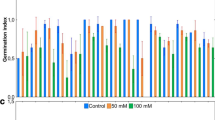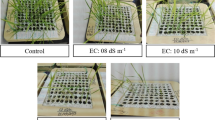Abstract
Abiotic stressors such as salinity cause major yield losses in maize (Zea mays). To reduce the impact of salinity and breed for salt tolerance, precise phenotypic screening of maize genotypes at seedling stage is imperative. A laboratory experiment was conducted in the Department of Genetics and Plant Breeding, Hajee Mohammad Danesh Science and Technology University, Dinajpur, Bangladesh during rabi season (November–March) of 2017–18. Twenty maize inbred lines were assessed for salt tolerance at both germination and the seedling stage. The experiment was conducted using a completely randomized block design with three replications and four treatments viz. T0 (0 dS m−1), T1 (5 dS m−1), T2 (10 dS m−1) and T3 (15 dS m−1). The analysis of variance revealed highly significant (p < 0.001) differences in genotypes, treatments and interaction of genotype × treatment for most of the germination, shoot and root traits except root shoot ratio (fresh). Overall, the germination and shoot trait performances were more affected for most of the genotypes viz. ML13, ML25, ML03 with increasing the salinity level while less affected for root traits. The superior performances under control conditions (T0) was revealed by ML05 and under salt stress conditions (T1, T2, T3), the genotype ML28. Most of the shoot and root traits revealed stronger and significant correlations with each other except root shoot ratio for fresh and dry weights. The results of salt tolerance index (STI) indicated the superiority of genotype ML28 followed by the genotypes ML05, ML10, ML26, and ML19. These genotypes should be considered for further salt tolerance breeding in maize.



Similar content being viewed by others
References
Aliu, S., Rusinovci, I., Gashi, B., Shala-Mayrhofer, V., Fetahu, S., Elezi, F., Lemmens, M. (2015). The effects of salt stress on seed germination of some maize (Zea mays L.) genotypes. In: I50th Croatian & 10th International Symposium on Agriculture. (pp. 299–303). Opatija, Croatia. http://sa.agr.hr.
Ashraf, M. Y., Akhtar, K., Hussain, F., & Iqbal, J. (2006). Screening of different accessions of three potential grass species from Cholistan desert for salt tolerance. Pakistan Journal of Botany, 38(5), 1589–1597.
Awad, M., Al Solaimani, S. G., & El Nakhlawy, F. S. (2014). Effect of soil salinity at germination and early growth stages of two maize (Zea mays L.) cultivars in Saudi Arabia. Journal of Bioscience and Agriculture Research, 1(1), 47–53.
Bagum, S. A., Billah, M. A., Hossain, N. E., Aktar, S. H., & Uddin, M. S. (2017). Detection of salt tolerant hybrid maize as germination indices and seedling growth performance. Bulgarian Journal of Agricultural Science, 23(5), 793–798.
Barnabás, B., Jäger, K., & Fehér, A. (2008). The effect of drought and heat stress on reproductive processes in cereals. Plant, Cell & Environment, 31(1), 11–38.
BBS (2020). Bangladesh Bureau of Statistics (BBS). Statistics and Informatics Division (SID). Ministry of Planning Government of the People’s Republic of Bangladesh. p 94. http://www.bbs.gov.bd/ Accessed 27 July 2020.
Billah, M., Latif, M. A., Hossain, N., & Uddin, M. S. (2017). Evaluation and selection of salt tolerant hybrid maize under hydroponics culture. Research on Crops, 18(3), 481–489.
Carpýcý, E. B., Celýk, N., & Bayram, G. (2009). Effects of salt stress on germination of some maize (Zea mays L.) cultivars. African Journal of Biotechnology, 8(19), 4918–4922.
Chaudhary, W. B., Ali, M. A., Bajwa, K. S., Iqbal, A., & Azmat, M. (2017). Correlation analysis of maize genotypes under saline stress and its impact on morphological characteristics. Life Science Journal, 14(7), 93–101.
Chen, M., Yang, Z., Liu, J., Zhu, T., Wei, X. F., & H., & Wang B,. (2018). Adaptation mechanism of salt excluders under saline conditions and its applications. International Journal of Molecular Sciences, 19(11), 3668.
Chinnusamy, V., Jagendorf, A., & Zhu, J. (2005). Understanding and improving salt tolerance in plants. Crop Science, 45(2), 437–448.
Clarke, D., Williams, S., Jahiruddin, M., Parks, K., & Salehin, M. (2015). Projections of on-farm salinity in coastal Bangladesh. Environment Science Process Impacts, 17(6), 1127–1136.
Fernandez, G.C.J. (1992). Effective selection criteria for assessing stress tolerance. In C. G. Kuo (Ed.), Proceedings of the international symposium on adaptation of vegetables and other food crops in temperature and water stress (pp. 257–27). Tainan: AVRDC Publication.
Hassan, N., Islam, M. S., & Barutcular, C. (2018). Responses of maize varieties to salt stress in relation to germination and seedling growth. International Journal of Molecular Sciences, 69, 1–11.
Ju, C., Zhang, W., Liu, Y., Gao, Y., Wang, X., Yan, J., Yang, X., & Li, J. (2018). Genetic analysis of seedling root traits reveals the association of root trait with other agronomic traits in maize. BMC Plant Biology, 18(1), 171.
Khan, A. S., Asad, M. A., & Ali, Z. (2003b). Assessment of genetic variability for NaCl tolerance in wheat. Pakistan Journal of Agricultural Sciences, 40(1), 33–36.
Khan, A. A., Rao, S. A., & McNeilly, T. (2003). Assessment of salinity tolerance based upon seedling root growth response functions in maize (Zea mays L.). Euphytica, 131(1), 81–89.
Khayatnezhad, M., & Gholamin, R. (2011). Effects of salt stress levels on five maize (Zea mays L.) cultivars at germination stage. African Journal of Biotechnology, 10(60), 12909–15.
Läuchli, A., & Epstein, E. (1990). Plant responses to saline and sodic conditions. In K. K. Tanji (Ed.), Agricultural salinity assessment and management (pp. 113–137). ASCE manuals and reports on engineering practice No. 71, ASCE, Reston, Va.
Maqbool, M. M., Wahid, A., Ali, A., Khan, S., Irshad, S., & Batool, S. (2020). Screening of maize hybrids against salt stress under hydroponic culture. Cereal Research Communications, 25, 1–7.
Munns, R., James, R. A., & Läuchli, A. (2006). Approaches to increasing the salt tolerance of wheat and other cereals. Journal of Experimental Botany, 57(5), 1025–1043.
R Core Team (2017). R: A language and environment for statistical computing. R Foundation for Statistical Computing, Vienna, Austria. URL https://www.R-project.org/.
Salehin, M., Chowdhury, M.M.A., Clarke, D, Mandal, S, Nowreen, S, Jahiruddin, M, Haque, A. (2018). Mechanisms and drivers of soil salinity in coastal Bangladesh. In Ecosystem services for well-being in deltas (pp. 333–347). Cham, Switzerland: Springer International Publishing.
Sikder, M. U., Haque, M. A., Jodder, R., Kumar, T., & Mondal, D. (2016). Polythene mulch and irrigation for mitigation of salinity effects on maize (Zea mays L.). The Agriculturists, 14(2), 1–3.
Sultana, R., Uddin, M. N., Rahim, M. A., & Fakir, M. S. (2016). Effect of salt stress on germination and seedling growth in four maize genotypes. International Journal of Natural and Social Science, 3(4), 20–27.
Tanzeel-ur-Rehman, Q. A., & Malik, A. (2020). Genetic variability for salt tolerance in maize seedlings. Genetics and Molecular Research, 19(1), gmr16039977.
Wei, T., Simko, V., Levy, M., Xie, Y., Jin, Y., & Zemla, J. (2017). Package ‘corrplot’. Statistician, 56(316):e24.
Acknowledgements
We offer special thanks to Ms. Susmita Sarmin, Ms. Sharika Hayder and Mr. Tajul Islam for helping during data recording. We would like to extend our thanks and sincere appreciation to Dr. Peter Dracatos for revising, making correction and reading the manuscript. We are thankful to Ms. Ayesha Azad Keya for reading the manuscript. We are also grateful to Ministry of Science and Technology of Bangladesh for providing the financial support of the research work.
Funding
The author(s) received no financial support for the authorship, and publication of this article.
Author information
Authors and Affiliations
Contributions
The research concept and designing was done by MAKA and MA. Experiment was conducted by MSM. Data analysis and manuscript preparation by MSM, MH and MA.
Corresponding author
Ethics declarations
Conflict of interest
The authors declare that they have no conflict of interest.
Additional information
Publisher's Note
Springer Nature remains neutral with regard to jurisdictional claims in published maps and institutional affiliations.
Supplementary Information
Below is the link to the electronic supplementary material.
Rights and permissions
About this article
Cite this article
Masuda, M.S., Azad, M.A.K., Hasanuzzaman, M. et al. Evaluation of salt tolerance in maize (Zea mays L.) at seedling stage through morphological characters and salt tolerance index. Plant Physiol. Rep. 26, 419–427 (2021). https://doi.org/10.1007/s40502-021-00611-2
Received:
Accepted:
Published:
Issue Date:
DOI: https://doi.org/10.1007/s40502-021-00611-2




